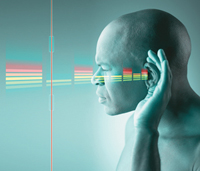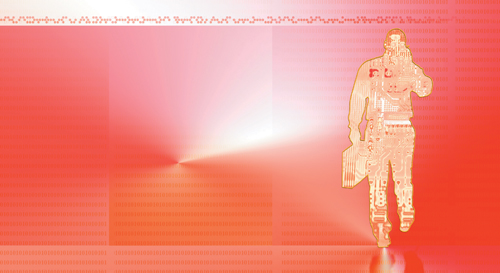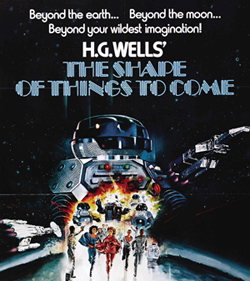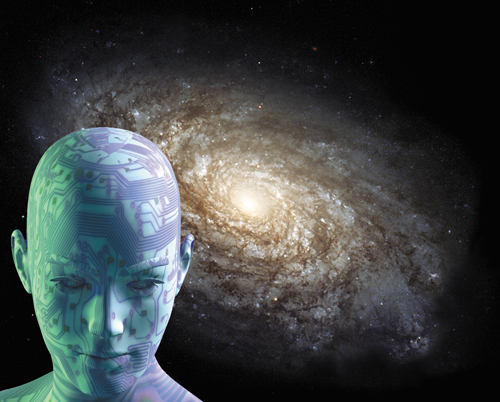
Your complimentary articles
You’ve read one of your four complimentary articles for this month.
You can read four articles free per month. To have complete access to the thousands of philosophy articles on this site, please
Science & Morality
When Paths Diverge
Jason Xenopoulos asks if accelerating technological change and the widening gap between rich and poor mean an imminent evolutionary divergence for humanity.
Back in 2012 I attended a keynote presentation by Bill Clinton. In his speech he said that “our common humanity matters more than our interesting differences.” This statement struck me as being both profound and profoundly disturbing. While it seemed on the surface like an inherently humanist position, it was also a deeply imperialistic one: it’s easy to ignore interesting differences, I thought, when yours is the dominant culture. Prompted by Clinton’s speech, I began questioning some of the contradictions inherent in my own beliefs.
Pierre Teilhard de Chardin (1881-1955), a paleontologist, evolutionary scientist and mystic, believed that human beings are evolving towards a state of spiritual convergence he called the Omega Point. By the time I discovered Teilhard de Chardin’s writings, my own theories regarding human evolution were already quite developed: I believed that human beings are evolving towards a state of pure consciousness – a single indivisible essence that can, in many respects, be viewed as God. I was delighted to find that many of my ideas echoed someone as knowledgeable as Teilhard de Chardin, because over the years I have had my fair share of run-ins with academics. For instance, in my twenties, emboldened by the self-assurance of youth, I went head-to-head with one of the world’s most revered paleoanthropologists, Lee Berger. This internationally reputed scholar argued that human evolution had essentially come to an end; offering a small concession, he said, “We might lose our baby toe.” I was horrified. Was it possible that a lifetime dedicated to one narrow angle of study had made him blind to the bigger picture… or was I mistaken? Have we in fact reached the end of our evolutionary journey?
Twenty years later I believe that I know the answers: yes and no. The human species is undoubtedly hurtling towards a new incarnation; but our evolution is now being propelled not by Darwinian forces of biological change, but by our own technological mastery. As Edward O. Wilson said, we are “about to decommission natural selection … Soon we must look deep within ourselves and decide what we wish to become” (Consilience: The Unity of Knowledge, 1999). So, viewed from a paleoanthropological perspective, human evolution may indeed have run its course; but from a technological point-of-view we are on the verge of transcending our biology, and perhaps even our mortality.
Singular Visions

Listening for the future
The futurist, and co-founder of Singularity University, Ray Kurzweil believes that at some point around 2045 artificial intelligence will become sufficiently powerful and generalised that it can start to improve its own design in a recursive fashion. This will result in a runaway effect: from that moment the intelligence of AI will expand with ever-accelerating rapidity, with consequences beyond our ability to predict. It will swiftly reach a point, says Kurzweil, “the pace of change is going to be so astonishingly quick that you won’t be able to follow it unless you enhance your own intelligence” through technology (from the film The Singularity is Near, 2010). He refers to this transcendental moment as the Singularity. David Dalrymple, MIT’s youngest-ever graduate student, explains Kurzweil’s theory in a poetic but succinct way. “The Singularity,” he says, “is the point where the exponential rising curve of our technology suddenly becomes the exponential rising curve of our selves” (ibid).
While Kurzweil’s vision of the Singularity is extremely vivid and fairly specific, there are many other futurists positing their own versions of our imminent techno-enabled transcendence. But although no one can be sure of exactly what this future will look like (life beyond the Singularity is inherently unknowable), there is general agreement that it will arise from a convergence between artificial intelligence, genetics, robotics, virtual reality, biotech, and nanotechnology. Jason Silva, an effusive techno-philosopher who is ecstatic about our enlightened future, claimed in a seminar in 2014 that “what currently fits in your pocket will eventually fit into a single blood cell and connect directly with your body.” This neatly encapsulates the trajectory he foresees towards convergence between humans and machines. But as those of us who believe in Teilhard de Chardin’s cosmogenesis realize, evolutionary convergence and evolutionary divergence are entwined in a complex dialectic.
Although the spiritual and intellectual convergence described by de Chardin is predicated on our ‘common humanity’, as Bill Clinton calls it, it is also a philosophy of inclusion, and therefore equally dependent on diversity and celebrating those ‘interesting differences’ that make up human culture. Unfortunately, in a world where our interesting differences often undermine our common humanity, the notion of our transcendence being technologically mediated inevitably raises questions about how inclusive it will actually be. Will our increasing mastery of human biology herald a new era of social harmony, or will it give rise to evolutionary divergence, creating a transcendent elite and a biologically inferior second class of beings, no longer considered quite human by those in power?

Future man goes to work
The Garden of Forking Paths
Divergent evolution, or speciation as biologists often call it, is the accumulation of differences between populations that can eventually lead to the formation of a new species. It’s ubiquitous in natural history. For instance, the story of man can be plotted according to a series of divergent paths, including about 60 million years ago when primates first starting diverging from other mammals. About 7 million years ago another divergence took place, giving rise to the hominid family by separating what would eventually become the first bipedal hominid from the ancestors of gorillas and chimpanzees. Palaeontology shows us that evolutionary change occurs at a glacial pace, so one would never have witnessed these epic divergences. By contrast, history shows us that technological change is accelerating. So we may in fact come upon divergent evolutionary paths yet again – and this time we may be forced to bear witness to the epic split.
Bestselling author and TED talker Juan Enriquez says that we’re entering a period of ‘hypernatural evolution’. He claims that over the past ten thousand years cultural evolution has occurred up to a hundred times faster than previously in our species’ history. As a result, he says, “we are transitioning from a hominid that is conscious of its environment into one that drastically shapes its own evolution. We have already started to evolve from Homo sapiens (a conscious hominid) into Homo evolutis: a hominid that directly and deliberately controls the evolution of its own and other species” (Homo Evolutis, 2011).
Although on a philosophical level I find this notion invigorating, I cannot shake the overriding concern that developing power of this magnitude will unleash the greediest and most evil of human tendencies. Although technology may be endowing us with the power of gods, morally speaking humanity is barely out of diapers. Ray Kurzweil argues that human beings are fundamentally transcendent – that biology is just another membrane to be transcended. In a 2006 interview with Steve Paulson, for instance he said, “We didn’t stay on the ground, we didn’t even stay on the planet. We have not stayed within the limitations of our biology.” He may be right, but I find it difficult to share his unbridled optimism. Don’t get me wrong: I covet the notion of immortality as much as the next mortal, but I am skeptical about our species’ ability to wield godlike power with the benevolence of gods. Last time I checked we were still waving our most advanced discoveries above our heads like clubs; and techno-enabled evolution will make the Tomahawk Cruise Missile look like a donkey jawbone. It has become a cliché to quote Lord Acton, who said, “power tends to corrupt, and absolute power corrupts absolutely,” but technology that gives us the ability to selectively engineer human immortality must surely be viewed as the epitome of Absolute Power.
I grew up in South Africa, a country where racial discrimination was hard-wired into society. Two decades of democracy have done little to erase those bitter memories, so it is not difficult for me to imagine a world in which our newfound liberties are once again yanked away by some greedy authority. Looking back, apartheid was clearly a morally-distorted institution; and yet at the time millions of reasonable people were caught up in its spell. What would prohibit another similarly malevolent meme from invading our collective psyche? I am not a Christian, but an uneasy sensation befalls me when I consider this verse from the Bible: “the gate is small and the way is narrow, and few find it.” Will the ruling class invoke this passage, or some other religious pretext, to defend their right to engineer divergence in their caste, despite the result being a disenfranchised class of subhuman refugees?
The Divisive Nature of Capitalism

Poster for film based on H.G. Wells’ novel
In his book Capital in the Twenty-First Century (2013), Nobel Prize-winning French economist Thomas Piketty, who is considered by many to be the Karl Marx of our generation, argues that capitalism naturally exacerbates wealth inequality, perpetuating a state in which the rich get richer whilst the poor become increasingly impoverished and disenfranchised. He draws on data from the past two hundred years to support this hypothesis, clearly demonstrating that the rate of return on capital has consistently outstripped the rate of growth in the economy, leading to an increasing concentration of wealth in the hands of the rich.
Piketty’s painstaking investigation debunks a commonly-held theory that the rapid global economic growth of the mid-twentieth century proves capitalism’s tendency to benefit the whole of society. He explains that although inequality did decrease between 1945 and1973, this was not due to any underlying dynamics of capitalism, as is often argued, but was a contrast to the instability that preceeded it during the First World War, the Great Depression, and the Second World War, during which time there was massive destruction of private wealth. Juxtaposing the artificially-retarded growth experienced during this dark period against the rapid economic growth following WWII effectively masks capitalism’s underlying tendency to exacerbate wealth inequality. Piketty’s book is groundbreaking because it is the first major study of wealth inequality to be supported by extensive data. He has made the discussion about income disparity scientific, using sophisticated data analysis to reveal the true, potentially destabilizing nature of capitalism.
Although all economists agree that capitalism must produce some degree of inequality, Piketty believes that excessive inequality isn’t only dangerous for the economy, but for democracy as well. Extrapolating his findings into the future paints a disturbing picture of a world moving towards levels of inequality likely to trigger severe social disruption. Overlay this dystopian socio-economic view onto Kurzweil’s predictions of a technological singularity, and you arrive at a picture of the future that looks terrifyingly like an H.G. Wells novel.
There can be no doubt that capitalism has become the engine of progress in most developed countries. Yet regardless of how one feels about it, it’s just a system of economic exchange. It is actually consumerism – our fanatical drive to constantly acquire new stuff – that is driving society towards ever-increasing levels of complexity. But our obsession with consumption is eating society from the inside out, driving us inexorably into a cul-de-sac of depleted resources. When the planet can no longer service our insatiable appetites, those who can will discard it like a wrapper from a candy bar. But the winner-takes-all dynamic driving consumerism is likely to severely limit access to this escape route, making it a luxury available only to the richest few.

Where are we heading?
The Need For Moral Evolution
The next stage of human evolution is upon us; it’s just a question of time. We cannot avoid what is baked into our DNA. As Jason Silva says, “we are the species that transforms and transcends. It’s what we are. It never stops” (ibid). But we are also the species that is conscious of its own evolution, and we must use this unique gift to direct that evolution in such a way as to transcend our moral limitations, not just our biological ones. Achieving practical immortality, for example, is not simply a case of replacing our disposable physical form with a more durable one: it is about achieving a state of grace in which we can honestly say that we are able to live with ourselves for eternity. In order to achieve such a state of grace, we must overcome our greed and fear; we must embrace the notion that our common humanity is forged from the strands of our interesting differences; and we must accept that the psychedelic fabric of our transcendent unification will be woven from the multicolored threads of our diversity. But it is not enough for us to simply preach inclusiveness; we also have to actively fight inequality by re-engineering the polarizing dynamics that underlie modern capitalism and consumerism. We need to do this not simply to redress the inequity of modern society, but to defend ourselves from the looming bifurcation of our species. If we do not act now, we may one day be forced to accept that we have engineered an irreversible evolutionary divergence that left the poorest among us to fend for themselves on a dying planet – a planet whose ability to sustain life had been terminally depleted by an elite class who used its resources to develop the technology to transcend its limitations and leave. When that time comes, will the posthuman elite look back on the forsaken with a sense of triumphant superiority, or with the intense pang of regret that a mother feels when abandoning her child?
© Jason Xenopoulos 2015
Jason Xenopoulos is a writer, filmmaker, and the Co-Founder, CEO & Chief Creative Officer at NATIVE VML, an African Digital Agency.









